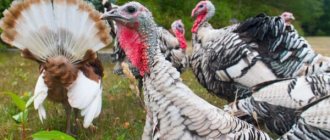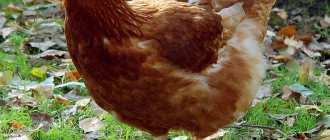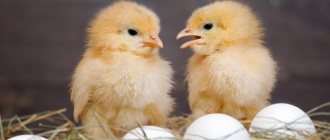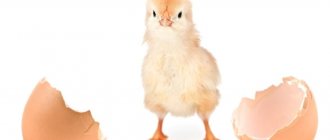The Hercules chicken breed, photos and descriptions of which give an idea of its uniqueness, is deservedly popular among Russian and foreign farmers and villagers. The reason for this is high productivity indicators and low requirements for feed.
The hen is on the left, the rooster is on the right
In Russia and neighboring countries there are many fans of these beautiful and unpretentious birds.
Origin story
Chickens of the Hercules breed were bred by Ukrainian poultry farmers. The goal of selection is to obtain individuals that quickly gain muscle mass and lay large eggs. Many business owners mistakenly consider Hercules to be a breed. In reality, this is the result of a 4-line cross of representatives of four meat and egg breeds .
The selection process lasted more than 10 years, hundreds of attempts were made to obtain highly productive individuals. Scientists from the Borki Research Institute and the National Academy of Agrarian Sciences of Ukraine took part in the creation of the breed group. The initiator of the selection is Professor Yu. V. Bondarenko.
Rolled chickens have been widely touted as the best in egg production and weight gain. For this reason, there was a stir around these birds at the beginning of the second millennium, accompanied by high demand. Gradually, the surge in popularity began to wane, but there are still many fans of this breed. Its important characteristic is the rapid sexual maturation of chickens and, accordingly, early egg production.
Description of the appearance and characteristics of the cross with photographs
Hercules are colorful individuals with a large build and a sedate gait.
There are 5 populations of this group, each of which has its own feather color:
- white;
- golden;
- silver;
- cuckoo;
- pockmarked
All representatives of the breed are characterized by a strong skeleton and a wide chest. The body is massive, with a flat back and tightly pressed wings of medium size.
The plumage is lush, but not loose, the face is unfeathered, red. The comb is leaf-shaped, with 4–6 pronounced teeth. The beak is pale yellow, slightly curved at the end, the legs are of medium height with massive hips. The description of this breed indicates that the birds develop according to the broiler type.
Hercules roosters have a more toned body with a wide chest and back. The typical chicken of this breed looks heavy, has a large round belly and large thighs. The average body weight of one-year-old roosters is 4.3–4.5 kg. This is confirmed by the experience of domestic poultry farmers. But advertising brochures claim that males of this age weigh at least 6 kg. Chickens are smaller than roosters, but not by much : by the end of the first year of life, they gain from 3.2 to 3.5 kg of live weight.
A rolled chicken at 2 months of age weighs at least 2 kg.
Infectious diseases
Characteristics of the Hercules breed include high resistance to various types of diseases.
But in poor housing conditions and with insufficiently balanced feeding, the bird can be affected by several diseases.
The chicken coop must be clean
Typhoid pullorosis
It is transmitted by airborne droplets, affecting the digestive system of chickens and adults.
Symptoms include immobility, increased thirst, foamy droppings, shortness of breath and lack of appetite. Young animals exhibit crowding, tucking up their paws and frequent squeaking.
They are treated with two drugs - furazolidone or biomycin.
Salmonellosis (paratyphoid)
Transmitted through eggs, air, food and water. It affects internal organs and is dangerous to humans when consuming contaminated meat and eggs. Signs: refusal to feed, foamy stools, increased thirst, swelling of the joints, abdomen and cloaca, lacrimation.
Druid horoscope for trees: Willow
To prevent the disease, immune serum is administered. Treatment is carried out with the drug furazolidone for three weeks. In parallel, streptomycin is given for 10 days. The habitat of sick individuals is subject to disinfection.
Colibacillosis
This disease is dangerous for both birds and humans. Chickens and young animals are more susceptible. The disease is accompanied by increased thirst, diarrhea, difficulty breathing and poor appetite.
Biomycin or terramycin are used in treatment.
Pasteurellosis
There is a high risk of infection in chickens under 3 months of age. The main carriers of infection are rodents and recovered birds.
The first signs are the appearance of foamy discharge from the beak, a bluish color of the crest, an increased need to drink and refusal to feed.
Treatment is effective only at the initial stage of the lesion. Several drugs are used - sulfamethazine, tetracycline 2% or norsulfazole.
Productivity of Hercules
Hercules chickens are highly productive. They begin to lay eggs early: at 4.5–6 months. The egg production of Hercules is 210–220 dark cream eggs per year. The average weight of each is 65–70 g, which is a good indicator of productivity. A distinctive feature of the breed is 2 or 3 yolks in the eggs of chickens in the first year of life. Moreover, the yolks are large and bright yellow.
There are good reviews about the quality of the meat. Many people think that it is very tasty.
Hercules are raised both to produce a large number of large eggs and for slaughter.
Rooster meat is more tender and juicy than chicken meat. The taste characteristics of the product are higher than those of broilers.
Advantages and disadvantages
Characteristics of the Hercules breed include several important advantages for poultry farmers:
- like broilers, they quickly gain weight;
- calm and peaceful disposition;
- excellent taste of eggs and meat;
- high resistance to many diseases and parasites;
- good tolerance to sudden changes in temperature and humidity;
- the eggs are large, contain large yolks (occupying 35% of the weight).
One of the disadvantages is that birds of the second and third generation are less productive than their parents.
Maintenance of broiler-type hybrids
Hercules chickens are distinguished by their calm character, lack of fussiness and non-conflict.
They are undemanding to living conditions, but the owner needs to provide the birds with a normal microclimate in the chicken coop:
- Full lighting and high-quality ventilation.
- Eliminate the possibility of drafts.
- Dry litter.
There are some peculiarities of keeping Hercules in a private household. The first ones you will have to face when buying chickens. Their price is almost 2 times higher than that of other breeds. This applies to both chicks and adults.
Thanks to its lush plumage, the Hercules breed tolerates low air temperatures well. But they must be short-term, otherwise the chickens will develop slowly and may get sick. During the cold season, it is necessary to ensure the optimal temperature for these chickens in the poultry house - +17°C.
Bird care
The Hercules chicken breed will not cause any difficulties in caring for. For these birds, a less troublesome way of keeping them is best - floor-based. At the same time, chickens require high-quality, fairly thick litter. This is especially important for chicken coops with concrete or dirt floors.
Creating comfortable conditions for the birds will allow them to obtain the productive qualities characteristic of this cross.
It is necessary to walk the chickens daily in a spacious area, avoiding crowding. An important characteristic of the breed is its tendency to become obese. In this regard, birds need to move more , which corresponds to their fairly high activity.
Caring for Hercules involves preventing the development of ectoparasites. For this purpose, each individual is regularly given ash baths by mixing wood ash and sand in equal proportions.
Feeding and diet
In order for the Hercules to grow quickly and gain weight well, they need to be fed properly.
You need to remember 2 rules for the content of this cross:
- chickens need food rich in nitrogenous substances;
- constant mineral feeding is required.
The following products are suitable for feeding poultry:
- grass meal;
- grain mixture;
- boiled fish;
- minced fish and meat;
- cottage cheese;
- legumes;
- grated fresh vegetables.
Chalk and egg shells are added to grain mixtures and other foods, as they are saturated with calcium. These additives must be present in the diet of laying hens.
It is important to regularly provide sand, sifted and cleaned. It helps birds get rid of food debris in the crop, which is the prevention of its diseases, blockage and the occurrence of inflammatory processes.
During the cold season, it is necessary to regularly feed steamed legumes, which are a source of vegetable protein.
Breeding on a private farm
When keeping and breeding on a private farm, Hercules chickens do not cause much trouble. They have a lot of advantages:
- ability to withstand sudden temperature changes;
- They tolerate summer heat just as well, so they thrive in regions with a southern climate;
- friendly, sociable character;
- not shy;
- calmly tolerate temporary inconveniences with contaminated litter;
- have good immunity.
But the Hercules have one significant drawback, which for many farmers and large poultry farms is the reason for refusing to breed these chickens. The fact is that this is not a breed, but a cross. Therefore, it is very difficult to obtain offspring that fully inherit all the qualities of their parents .
So far, only 1 solution has been found: crossing hens not with Hercules roosters, but with representatives of the Cornish breed.
In this case, strong and hardy chickens are obtained, with good disease resistance and an equally friendly character.
Often, to update the stock, one more purchase of cross-country eggs is required.
What to feed an adult flock?
The main components of a good appetite are: the presence of fresh water in drinking bowls, frequent walks, lighting, and taking care of your health. For all types of chickens, you should install a container with pebbles, chalk and shells. This serves as a source of essential minerals and promotes the proper functioning of the digestive system.
At different age periods, the quality and quantity of feed differs. It is especially important to ensure that the diet is saturated and balanced during the growth stage. For the hybrid in question, this period lasts up to a year. Protein combined grain mixtures serve as the basis of the daily diet.
In addition, root vegetables, vegetables and fruits are used, as well as herbs - dry or fresh. And additionally use vitamin and mineral supplements.
You can also add other products where possible, which serve as additional sources of valuable substances. Let's consider several options for dietary supplements.
- Flaxseed (about 10 grams per 1 bush).
- Salt – no more than 1 gram.
- Yeast.
- Live food – worms, maggots.
- Meat and fish trimmings.
- In the winter season, a mandatory addition should be pine needle flour, clover or granulated dry grass. It is convenient to add these products to wet mash.
Due to their large build, laying hens need spacious coops where they will not feel cramped. Again, their heavy weight does not allow them to rest on their perches - they cannot fly at all, and have difficulty climbing to high places.
Therefore, it is extremely important to monitor the quality and condition of the litter, on which the family spends most of the day in the dark. In winter, this is especially important, because it is not possible to replace deep litter very often.
Poultry farmers in the northern regions were very happy with the appearance of the Hercules laying hen at the dawn of the 21st century. Indeed, thanks to the efforts of scientists, the bird has gained resistance to cold weather and can be kept even in harsh climates. Cold-resistant Choughs can tolerate winter keeping in a poultry house without heating devices without harm, and short walks in the fresh air are also acceptable.
Birds swarm in the snow with great pleasure, and this makes them even stronger and healthier. In addition, this is an excellent opportunity to ventilate the poultry house. But on the coldest days, when the temperature is below -20 degrees, it is better not to take the family out for walks. For such cases, ventilation must be provided in the room so that the air does not stagnate and pathogenic microorganisms cannot multiply in it.
There should also be enough space in the walking yard so that the birds do not crowd, but can calmly make their leisurely walks. Many farmers in the spring or before winter sow the area of their walking yard with useful types of grass (for example, clover and nettle) or cereal crops. Thanks to this approach, the birds will be able to peck fresh greens in early spring, when the shoots appear.
Raising chickens
You can get Hercules in 3 ways:
- buy adult individuals and get offspring from them (fraught with the loss of the main advantages of this cross);
- purchase Hercules eggs and get chickens yourself;
- buy Hercules chickens and raise them.
These methods require knowledge of the rules for raising young animals of this cross. When buying eggs and delicate transportation to the farm, and proper maintenance in the incubator, the hatchability is high - more than 87%.
Hercules chickens have good survival rate, but their immunity is weaker than that of adults.
Caring for young animals is as follows:
- in the first month of life, you need to give chickens daily oatmeal porridge, to which finely chopped boiled chicken eggs, fresh cottage cheese and small cereals are added;
- starting from the third week of life, pre-cleaned sunflower cake is introduced into the diet; Cake can be replaced with seeds;
- at the end of the first month of life, complementary foods in the form of finely chopped greens and vegetables (nettle, carrots, dandelion) begin to be introduced.
It is important to remember that grain mixtures cannot be steamed, as the food will lose most of its nutritional properties. There is a ban on foods rich in fiber and flour. Such foods can cause blockage of the crop.
Prevention
Most diseases can be avoided with regular preventative care. It will help you save not only individual individuals, but also entire livestock. Follow the recommendations and you will be able to protect your birds from illness.
- It is not recommended to place young animals and adults in the same house. Chickens have weak immunity, so even a minor disease transmitted from an adult can cause their death.
- If a disease is detected, immediately remove the sick individual to quarantine.
- If a sick bird is found, the room where it was located must be treated with disinfectant solutions.
- Make sure the food you give your chickens is balanced. Often it is bad food that causes illness.
- Monitor the habitat of the livestock. Excessive contamination of the chicken coop is not allowed. Unsanitary conditions cause many diseases.
If you follow these simple rules, you will significantly reduce the risk of disease in your poultry, or at least prevent the death of a large number of birds.











